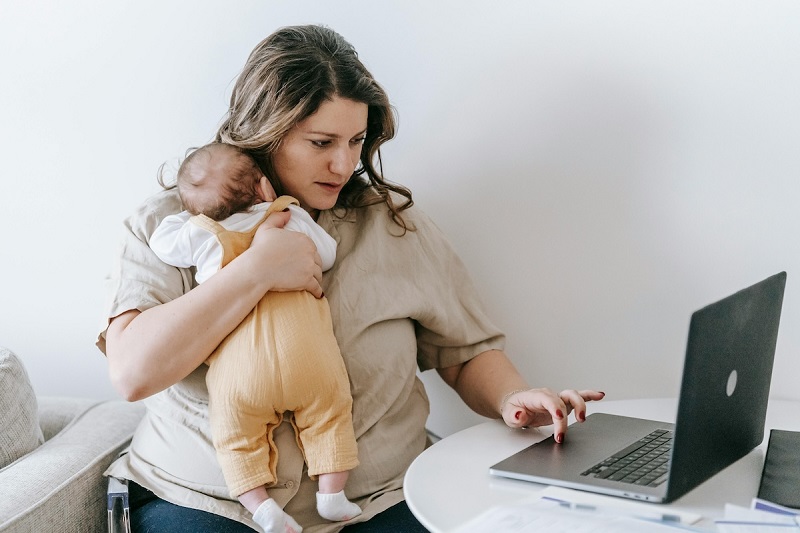It should come as no surprise to most readers of this newsletter that the landscape of postpartum support, especially in the U.S., is poor. As I put it in Cribsheet, “one minute you’re a cherished vessel, the next you’re a lactation-oriented baby accessory.” That statement is largely about how this feels, about the focus of attention, but it extends to lack of support in more tangible ways.
For example: all women are recommended to have at least one postpartum visit with a medical provider. This may seem a low bar, but even that doesn’t happen: review data suggests that less than 75% of women see a provider, with even lower rates for those who have preexisting conditions.

Going further, even if women see a provider for a postpartum visit, the chance that they go back to see a primary care provider (PCP) is even lower. Estimates suggest that only about 50% of women, even those with preexisting conditions, see a PCP during their first year postpartum. This primary care is crucial, especially for people struggling with diseases like diabetes and hypertension, which can exacerbate during pregnancy.
If we take it that this is a problem — and I strongly believe that it is — the question is what to do about it. Many of the solutions that come to mind are big-picture. More comprehensive health coverage. Better paid leave so people have more time and resources. Child care subsidies so parents worry less about child care and can focus on their own health. These policy priorities are important, but the reality is that they are hard, and not likely to be complete in the short term.
Without giving up on these, there is value to focusing — also — on approaches that might work within the current system. It seems possible that smaller-scale approaches to removing barriers might help a lot of people, even if they do not fix our big-picture problems. Of course, we can’t know the value of smaller-scale interventions if we do not have data.
Which brings me to today’s topic, which is an exciting new paper out last week in JAMA Network Open. The paper uses a simple “nudge”-based intervention to try to impact whether women reconnect with a primary care doctor postpartum.
We’ll run through the intervention and results, and then I’ll come back to the big picture.
The intervention
The paper is entitled “Increasing Postpartum Primary Care Engagement through Default Scheduling and Tailored Messaging: A Randomized Clinical Trial.” The title is so long that it pretty much fully summarizes the paper. It’s a randomized trial in which the authors use default scheduling and tailored messaging to try to improve engagement with primary care.
A few more details…
The paper enrolled 360 patients, either pregnant or recently postpartum, who had one of several conditions making them high-risk (e.g. obesity, diabetes, hypertension, depression). The patients all had a PCP listed on their medical records, and 21% of them were covered by Medicaid.
Half of the patients were randomized into the intervention group, half into the control. Because the experiment was randomized, we can be confident that any differences across groups in the outcome are causally linked to the intervention.
The intervention had several components. Individuals were messaged about the importance of seeing a PCP, and — this is a key part — a staff member would make an appointment for them, after messaging them about scheduling preferences. Future text messages reminded them of the appointment, using language that has been shown to increase compliance.
The core idea in this intervention is to remove the scheduling barrier for people. The research is premised on the idea that even if you have insurance and you have a PCP, finding the moment to call and make that appointment is a lift. If this is right, removing that barrier for people should make a difference.
The question is: how much does this matter?
The results
The answer is: a surprising amount.
In the control group, 22% of patients completed a primary care visit within four months of birth. In the intervention group, it was 40% of patients. That’s a very big jump from a fairly small nudge. The authors also found that the intervention group was less likely to have a postpartum readmission to the hospital (1.7%, versus 5.8% in the control group).
The graph below shows why this matters by looking at the differences between treatment and control group in actual medical assessment and planning. The intervention group is more likely to have blood pressure testing, weight assessment, and mood screening. They are also more likely to have plans for future diabetes screening and mental health care, and have discussed their plans for contraception.
At the end of the paper, the authors point out that while the effect of the intervention is large, there is more to do. Which is true! Getting these numbers up even higher would be good. But it’s a start.
The big picture
This paper is about one particular issue — postpartum primary care — but it relates broadly to how we address the challenge of improving maternal and child health. To go back to the top: there are so many big-picture issues that we all want to fix — that I hope we do fix! But while we are waiting on those, it would be a mistake not to pursue the smaller fixes that might make more difference than we imagine.
This intervention removed the barrier of making an appointment. There are other simple barriers to care — transportation or co-pays, for example — that could be removed. While we wait for child care funding to be passed, maybe we at least try to make it easier for people to find care.
These practical barriers still matter even if we do get the big policies passed. Many states have paid leave, but it can be so hard to navigate that take-up is low. Tech-based interventions (like this one, guiding people through paid leave in New York) can help fix that.
Bottom line: It’s exciting to be an architect — to think about the big picture of what we want the house to look like, and how great it will be when all the rooms are beautiful. But while we are waiting on that, there is a lot of value to being the plumber and unclogging the toilets.
Community Guidelines




















Log in
Thanks for the long covid breakdown! Those articles drive me absolutely batty. It also seems that they used data from the beginning of the pandemic with the original strain. So many problems with these claims. They also do not give an idea of a baseline of post-infectious syndromes generally. What if you don’t have long covid, but long something else? There are other post-infectious problems out there, not just from covid. The idea you could rule out any cause but covid just isn’t so.
The postpartum screen questions have one major flaw: it lacks an accurate baseline.
I remember reading the epds questions (in the middle of covid lock down), thinking, “well in the past week…”
But it didn’t take in to consideration how I had been feeling prior to that week, or establish what was “normal”.
I still don’t feel “normal”, and we as a society don’t talk about what is “normal” mom anxiety.
I had a pretty harrowing birth and postpartum experience, and even though I am well-versed in healthcare I was SHOCKED at how much work *I* had to do to get the support I needed. Beyond scheduling my own appointments (plural because I had preeclampsia that led to elevated BP for an extended time) and asking for follow-up information from my doc and PCP, I had to go out of network to get the proper support I needed for PPD and psychosis. Even though I was at high risk for PPD and I had talked about it a lot with my doc prior to birth, the minute I was out of the ICU and my son was out of the NICU it was like, “Okay well… bye bye!” It was so bad that I called and wrote to multiple contacts at both my PCP’s office, as well as my OB office AND the hospital where I delivered to say, “I think I am having postpartum psychosis. I think I really need help immediately” and the response I got was A LIST OF CONTACT I COULD TRY MYSELF. And you know what? None of them could see me for MONTHS. Luckily I found someone that I could pay OUT OF POCKET to see me quickly to help regulate my medication dosage. It’s really scary for me to think what someone without my background knowledge and resources would be put through. Needless to say all the docs and offices involved got a very formal and stern letter from me afterward. All I needed was someone to call me back and say, “here let me help you navigate this” and that would have made a world of difference.
Interesting. I remember being shocked in the hospital that I needed to personally call and schedule my follow-up with my OB oh and I couldn’t bring my baby with me. I’m glad you brought up childcare because for me that was a much bigger issue. Fortunately my PCP let me do a virtual appointment but that obviously wouldn’t work for most conditions.
Whoa, why wouldn’t they let you bring the baby?? I don’t get that at all. My baby and also my husband were at my post partum visits.
Fascinating research with an unsurprising result. Thanks for sharing, Emily.
My midwifery group began automatically scheduling the 3 wk postpartum visit via a call from an OB case manager to the postpartum room on day 1 or 2, and a 5-7 d PP visit for people with complications (high BP or cesarean, for example). This has made a big difference in postpartum follow up. While no show rates are still high for PP visits, taking away the scheduling barrier from busy moms makes a big difference.
Attending the PP visit is an important segue into receiving care from a PCP for chronic co fictions. The suggestion and even the follow up appointment can be made at that visit.
One barrier I want to call attention to: many postpartum moms lose Medicaid coverage after giving birth. For example, in WI where I live, my patients’ Medicaid expires the last day of the month in which the patient is due (but does cover the PP visit). This makes any kind of PP follow up difficult. My clinic has a sliding fee scale for the uninsured, but many do not.
Seeing a PCP is always great. I would note two things here:
1) Plenty of OB’s and midwives are trying to move into some primary care roles. They also want to treat your hypertension, etc. This may or may not be a good thing, but it’s a thing.
2) Good freaking luck getting a timely appointment with a PCP! I recently called to schedule a routine physical in a decent-sized metro area and most doctors had wait times approaching a YEAR. I found one who could schedule “only” 6 months out, in 2025. My elderly MIL recently had a nasty virus and wanted a doctor appointment. Nobody at her PCP practice could see her for 2 months. They told her to go to urgent care. Yikes.